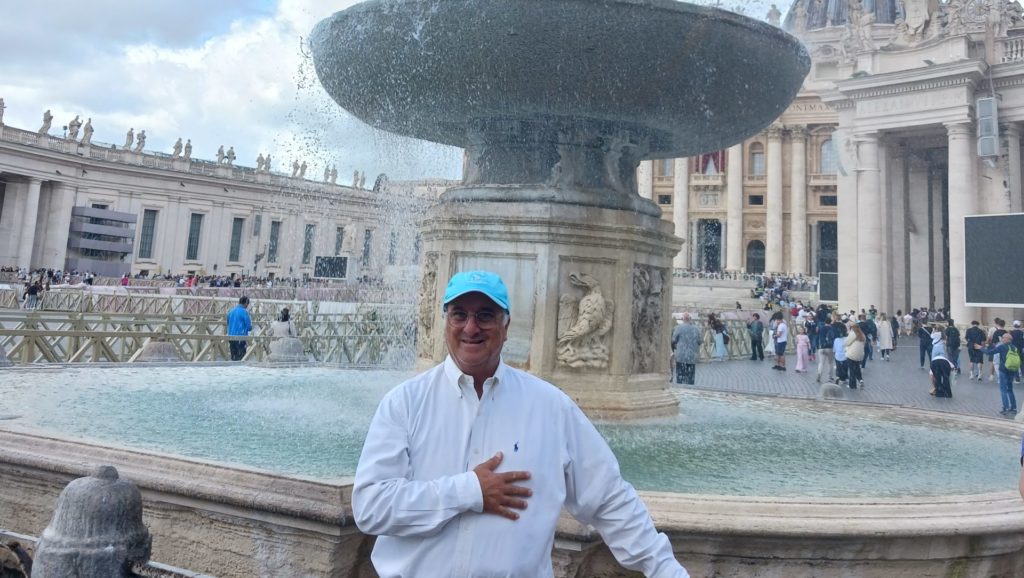First impressions and a final goodbye
I had never, until this past May, been to Rome, or for that matter, Italy. I found myself in the Eternal City to pay my respects to Pope Francis and to chronicle my experience of the conclave. I soon learned how many of us from around the world had come to do the same.
Early on I met a young bicyclist couple — Noemi and Richard — who had churned all the way from Milan, 60 miles a day for four days, to say goodbye to Pope Francis.
“He was near the people,” said Noemi. A Catholic teacher from San Paolo School outside Milan, she came with her class to meet Francis the day before he was hurried to the hospital. I suggested she might have been among his final visitors.
“I think a small group of disabled people were his last,” she corrected me. “He moved so many people to come here to Rome. He was affectionate to them and now they are to him. I miss him terribly.” Many others I met expressed similar sentiments.
I took myself that first day — though exhausted from the 12-hour nonstop plane ride from Los Angeles — to the eighth Novendiales Mass at Santa Maria Maggiore.
It was a two-hour wait to see the Holy Father’s tomb. There were tens of thousands of visitors, many of whom were Italians. Francis was, after all, their Papa, from an Italian family that immigrated to Argentina. Perhaps that prepared him to speak to so many in their own tongue. He knew what it meant to be different from scratch. A scratch that led to the priesthood — and Rome.
Finally, I entered the nave. Santa Maria Maggiore is earthen, dim, like human nature Francis would understand too well. I inched down the west aisle toward the burial site. I expected something grand, but it was not. It is Francis, the man who like St. Francis gave everything away.
A simple cutout alcove of white stone with not a wrinkle in it, only a small cross on the wall. On the floor carved in Latin: Franciscus. That is all. Not his birth or death years.
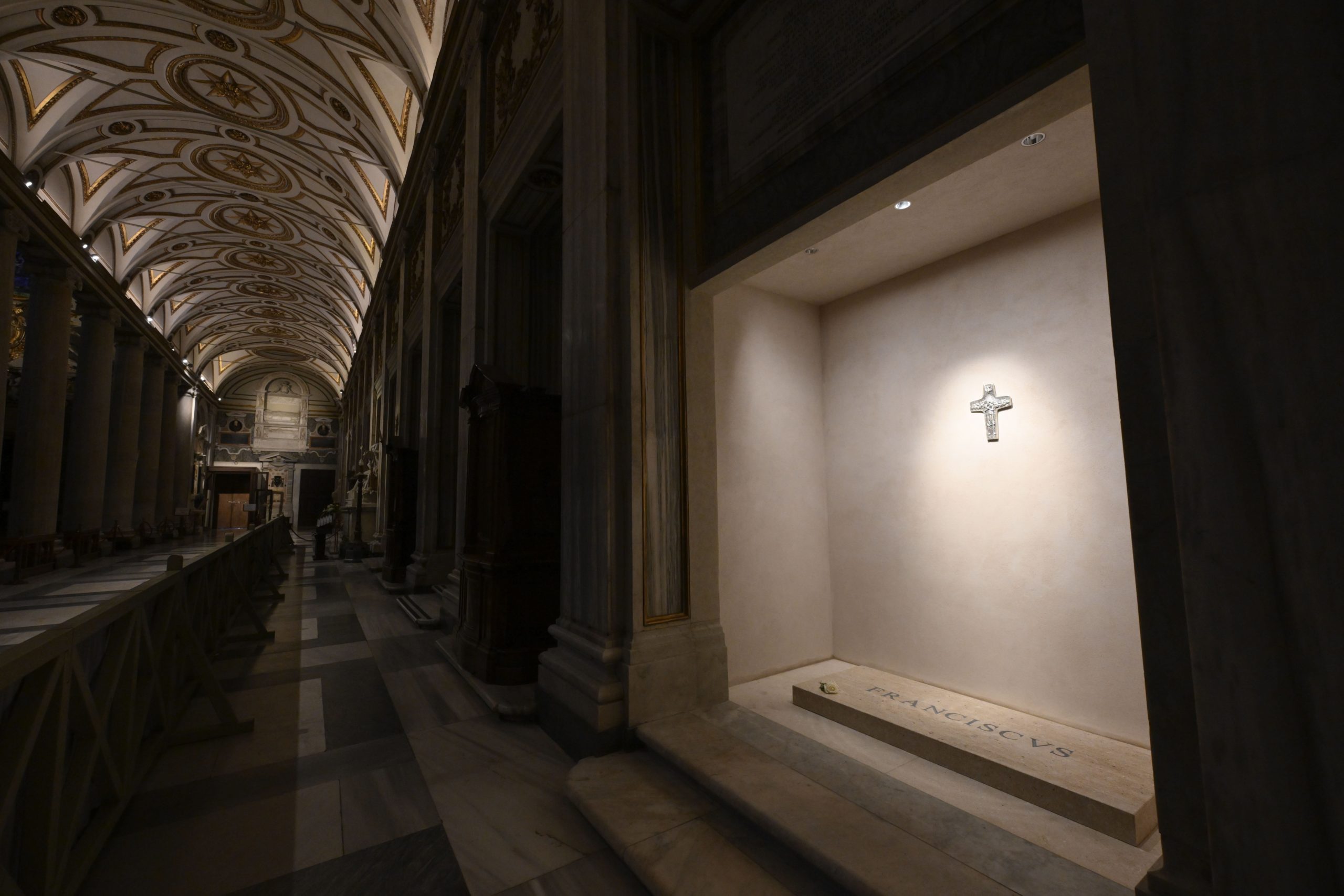
Every evening at 9 p.m., Rome hears the tolling of the bell at Maggiore, one called “the lost woman” (“la sperduta”). It is for any woman or man who has lost the way. The bells lead home. Francis must have loved to hear them.
I also attended the ninth and last Francis memorial Mass in Rome. When it was over, I went to the famous black marble statue of St. Peter, his head featuring a gold metal crown and his hand pointing a finger as if to make a point. Pilgrims passing by hold the black marble feet in its black marble sandal. A female guard came up, dark green eyes blazing, “Prego! No touch!” Quickly, as she turned away, I swept my palm over Peter’s feet. It, too, was smooth from sinners like me.
Waiting and wondering
At 9 a.m., a cascade of bells at St. Peter’s rang out. At 10 a.m, all 130 cardinals, like a flock of red birds, huddled for a Mass in the basilica, their last public act before they sequestered.
The first day of the conclave began in light, uncertain rain. In the great crowd waiting for smoke, I met a priest from England with a particularly large Roman collar and an old-time wide-brimmed black hat. He shared his hopes with me.
“I have an impossible choice and a possible one,” he smiled with his dark glasses raising. “Cardinal Joseph Zen from China, who was imprisoned for sedition in Hong Kong, and nearly executed, is here, miraculously, but he is too old. My strong favorite is Cardinal Robert Sarah of Guinea. He is a very holy man and a good writer.”
Bishop Robert Barron, speaking to ETWN, said he wanted “a quiet papacy.” He thought there might be something of a correction, though he had great love for Francis, who first appointed him an auxiliary bishop of Los Angeles in 2015.
I took a break and went to the Vatican post office to mail postcards of Francis blessing a child in a crowd. There was a long line and only one clerk. Two other clerks stood around looking away, doing, it seemed, nothing.
I am an old philatelist. This 2025 Vatican stamp was especially made for the absent seat of the pope and for the conclave. It is valued at 2.45 euros, or about $3, and features a sort of seal of the pope, with angels and perhaps a cardinal kneeling and praying under a canopy.
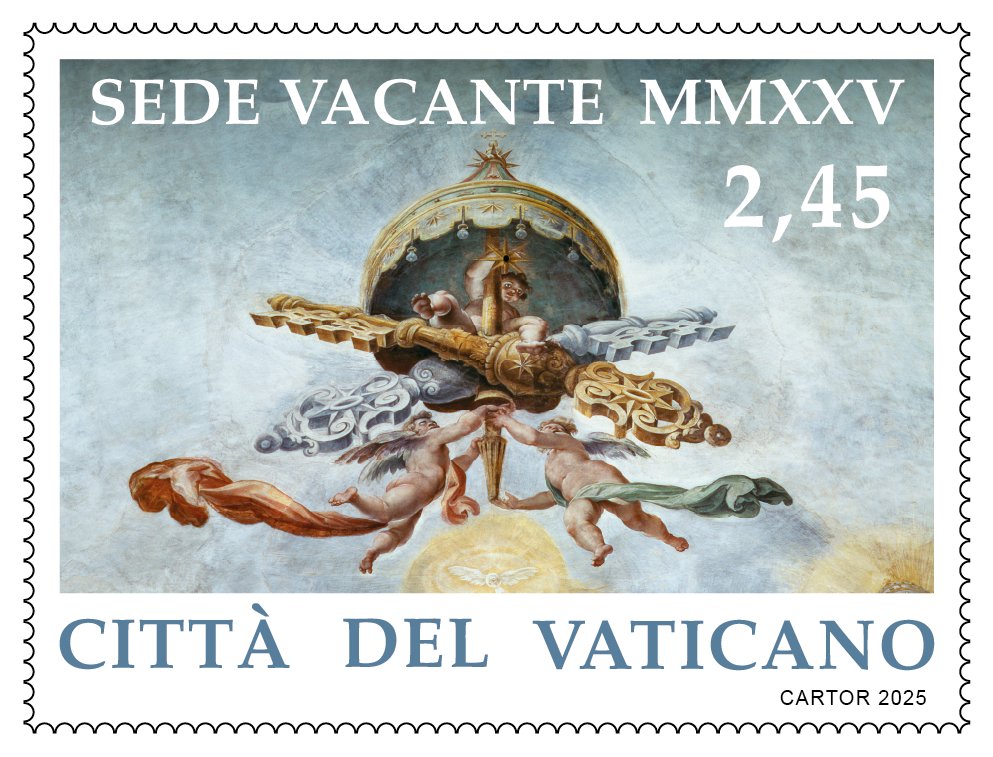
In line I met Veronica, a Swiss journalist. She was not happy that Francis did not go “all the way” to women priests, but she acknowledged that he did advance women for more key roles.
“This line is eternal, but we are dealing with eternal things now,” she said as she produced a wry smile. “In the Eternal City, no less,” I responded.
By 8 p.m., the pale blue sky started to fade. My knees and feet were hurting.
Suddenly, black smoke trailed horizontal in the night breeze out the pipe. We cheered a bit and then retired to our homes and hotels to sleep restlessly. No new pope yet — and a long night.
The city of God and the city of man
The Colosseum of Rome is depressing. It hangs heavy on the land. It is believed that at least 5,000 early Christians who would not bow to Caesar as God were killed there in the most gruesome ways: burned alive, gutted by swords, or torn apart by Caspian tigers and Barbary lions. Yet it is the most popular tourist site in Rome, over St. Peter’s Basilica and the Sistine Chapel. I, too, was drawn, to inhale its death, to try and understand its attraction, and to marvel at its gigantic construction by mostly slave hands.
While the Colosseum lasted, along with the Roman Empire, about 300 to 400 years, it has long been empty of any purpose but gaping. Four metro stops away, St. Peter’s bones and the church built over them are now 2,000 years old.
You move through dark tunnels to the inner sanctum. It is not the Edenic green of a baseball outfield or a soccer oval that greets you, but a maze of stone tunnels in which the animals and men were held before the contests began, known as the hypogeum. It featured a series of rope pulleys and elevators that could shift a wild animal from one level of the maze to another or, indeed, to the arena itself. There, gladiators would meet a leopard or tiger or rhinoceros. Another gladiator. Or some sad sack called a Christian, often with no weapons or clothes.
This was all called entertainment. If gladiators fought bravely, the emperor looking on spared them. But if a gladiator showed weakness, he was given the thumbs down and ran through with a sword. Christians had no chance.
“St. Augustine was here, long before he was a saint,” I mumbled to a woman named Marlene as we regarded the stony dirt-filled labyrinth. She cocked her head slightly, as if to say, tell me more.
A boyhood friend of Augustine’s named Alypius followed his friend to Rome from Tagaste in the North African empire of Carthage. He thought he’d study the law. And he did. But he developed a taste for “the tumult of inhuman frenzy” in the Colosseum, which at first made him shut his eyes. Augustine relates it all in his “Confessions”:
“Would that he had shut his ears also! For one of the combatants fell in the fight a mighty cry from the whole audience stirred him so strongly that, overcome by curiosity … he opened his eyes and was struck by a deeper wound in his soul than the victim. … For as soon as Alypius fixed his eyes on the bloody pastime, unwittingly drinking in the madness, he delighted with the wicked contest and drunk with blood lust. He now was no longer the same man who came in but was one of the mob.
After counsel and rebuke by his old friend, Alypius finally came around. How so? “Thou didst pluck him out,” Augustine writes, “with a most merciful hand” and “taught him not to rest his confidence in himself but in Thee.”
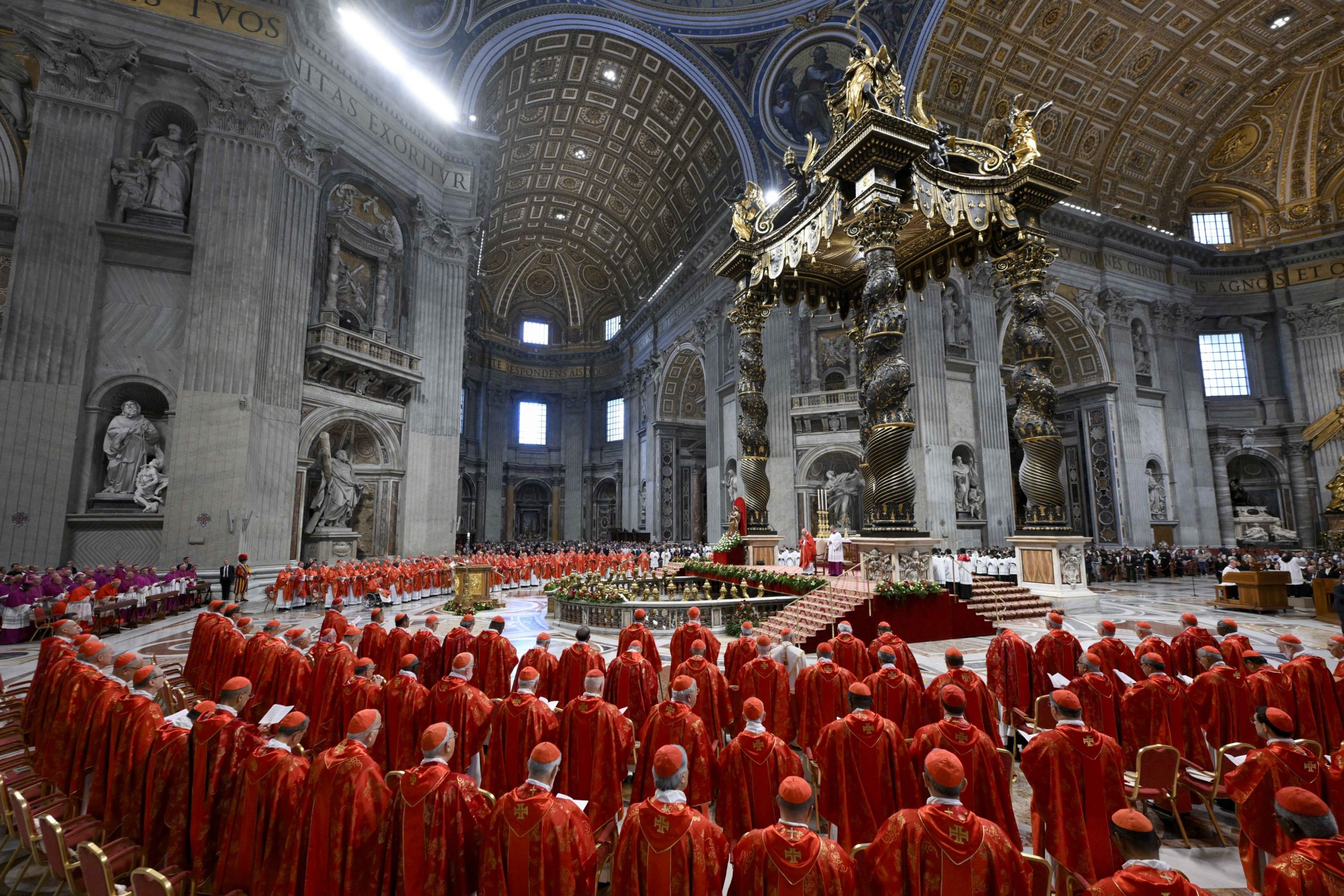
Rome, white smoke, and disbelief
I missed the second vote Thursday morning, back in my Hotel Ottaviano Augusto writing furiously about what I had seen and heard. It was black smoke again. At 4 p.m., I walked the mile from my hotel to St. Peter’s Square for the smoke watch. About 5 p.m. on May 8, I was in place for the last vote of the day.
The Italians in my circle seemed to like Cardinal Zuppi from Bologna; they included 74-year-old Paquale from Ischia off the coast of Naples, two redhead sisters from Rome, and the cafe owner on Via Germanico, who was astonished I returned to pay when I forgot my wallet. He gifted me with a free expresso. The late afternoon sun was growing. Everyone was peeling sweaters, long sleeves. And a crowd was gathering in the center of St. Peter’s Square that was restricted yesterday. Musicians. The military. Do they know something we don’t?
Rafaela, a reporter with the Italian newspaper La Stampa, winked. “It’s a sign. Maybe votes are swinging.”
Just about an hour later, shouts went up, even from journalists, legendarily stoic. White smoke! White smoke! It curled out of the pipe right above Michelangelo’s ceiling painting of God touching man with his pointer finger as if to say, “Now I give you part of me. Don’t waste it. Do some higher good.”
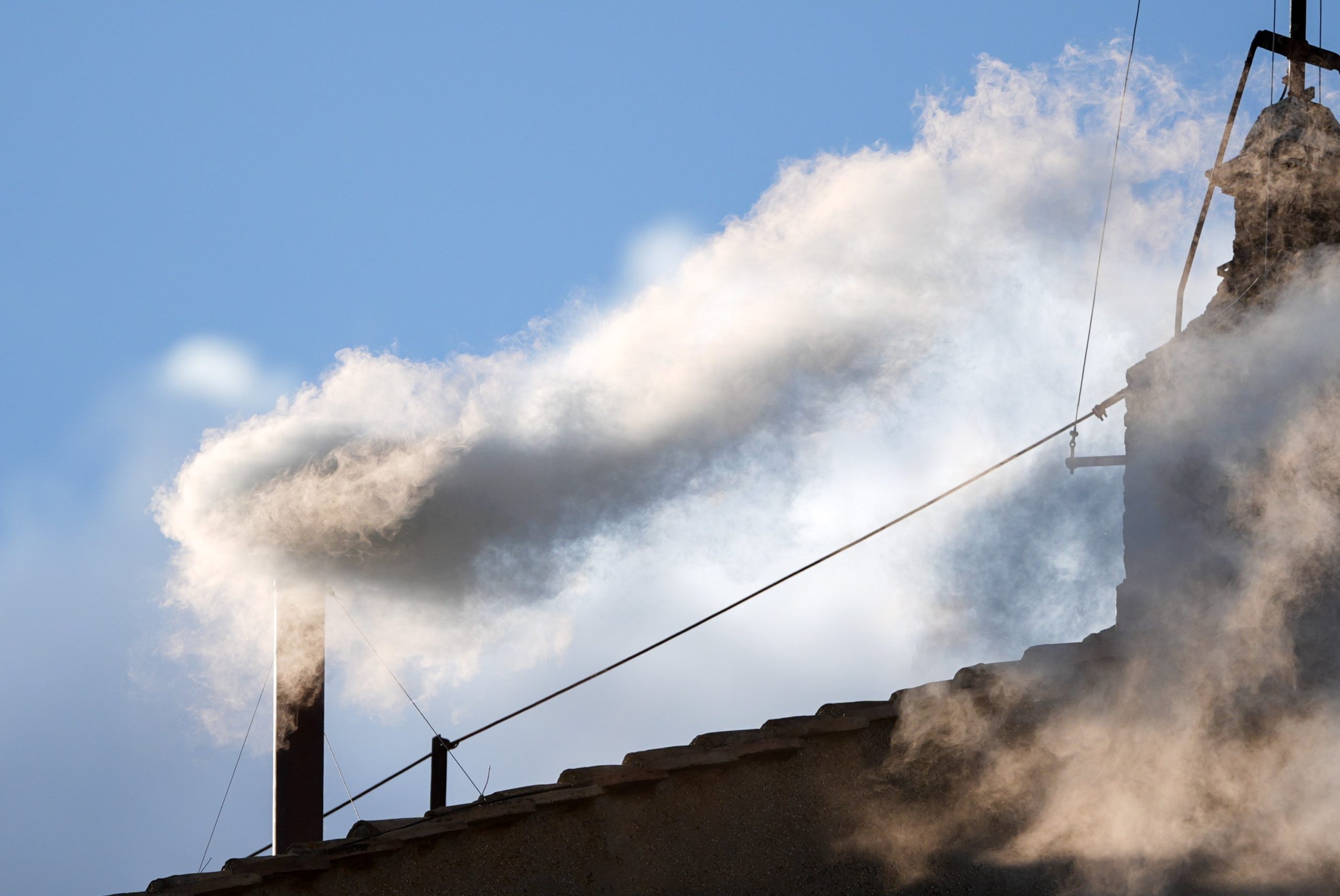
When the “Habemus Papam” was pronounced from the balcony of St. Peter’s an hour later, no one could pronounce his name at first. I quickly checked my list of Italians for someone named “Roberto.” And then the crowd yelled, “An American! An American is pope!”
I breathed out; tears welled into my eyes. People pounded me on the back, shaking my hand. They had heard me speaking English.
A tall, young Italian man in front of me who had been leaning to give me a view shakes my hand hard, leaving, “Wonderful! Wonderful!” He was really happy. “Oh, an American can do so many things we cannot!”
A pregnant Scottish woman named Clare rubbed her belly. Her Italian husband was manning a camera. “I hope he isn’t too excited!” she laughed. “I am. My baby is.”
A Polish couple, Marcin and Matsosia, embraced me at a cafe in the Piazza Resorgiamento. Marcin pumped my hand so hard I thought he was going to pull it off. “Like John Paul II, he is strong, strong, Pope Leo.” Thou plucked him out, I thought. And us.
I walked back Via Leone (yes, Leo Street!) to the hotel feeling elated. Francis was the first I felt personally close to. But this one is all-American.
He is not afraid to back a serious underdog: the Chicago White Sox. He picks Villanova over Georgetown; this Hoya can forgive him. It’s great he will defend workers in a Second Industrial Revolution as Pope Leo XIII did in the first. I love that he held his head in his hands from sheer terror when he saw the votes mounting his way; I love that the frontrunner Cardinal Tagle gave him a candy in the middle of the voting — and he took it!
Please speak truth to power, dear Pope Leo XIV. Water always wears down rock. Please take on the rock of intolerance, hatred, arrogance, fear. You are Peter. Upon this rock hangs the future of the world. And remember the breeze off Lake Michigan! I will remember the warm Roman days and the multitudes gathered to greet you.
